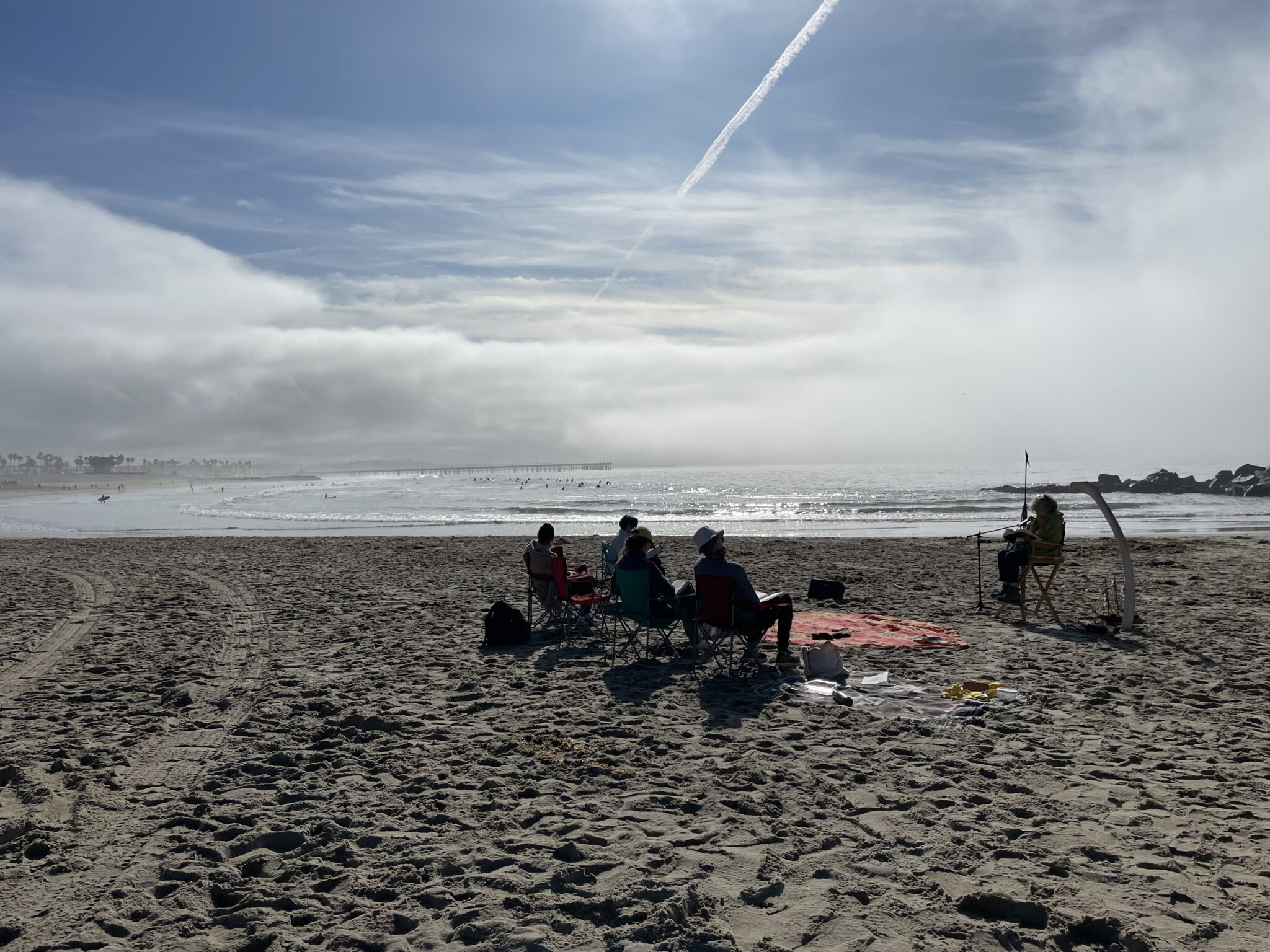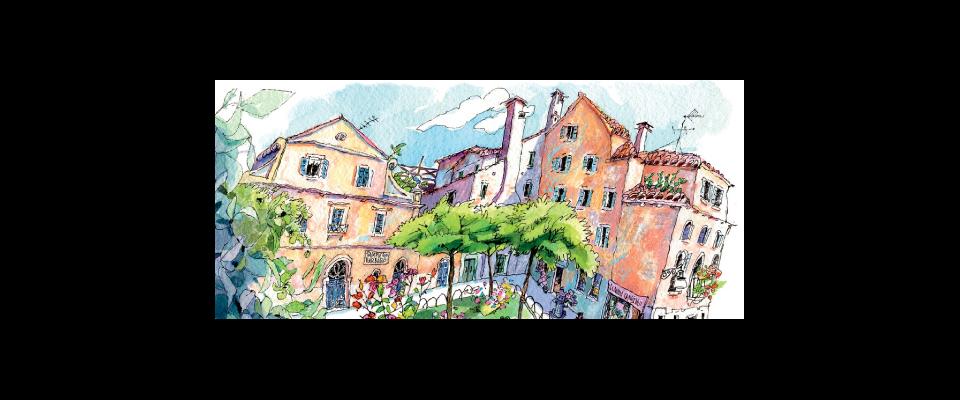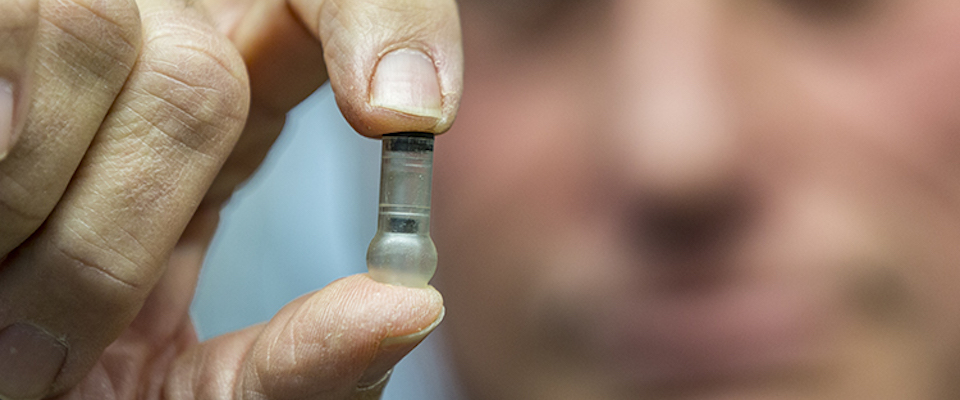One Saturday morning, a few hundred yards windward of the Venice Beach basketball courts, a small group gathered on the sand. A man in a Lakers sweatshirt faced them from a director’s chair, flanked by a harpoon and a whale rib. “My thoughts were at length carried in other directions,” he read into a microphone, “so that for the present dark Ahab slipped my mind.” The group politely applauded as he stepped down. A woman with wavy gray hair, dog-eared paperback in hand, rose and began “The Ramadan.” The 29th annual beach read of Moby-Dick, Herman Melville’s 1851 classic, was underway.
Venice Oceanarium, a non-profit “museum without walls,” hosts this event in late November, when the gray whales migrating from Arctic seas to Baja lagoons begin to pass this part of the coastline. The reading spans two days, from sunrise to sundown. It furthers the group’s mission to impart a better understanding of the ocean, and, in doing so, secure a place for the marine ecosystem in Venice’s genius loci, alongside boardwalk oddities and tranquil canals. Unlike New England Moby-Dick readings, like the overnight marathons in New Bedford and Mystic Seaport, Venice embraces a “loose-fish” philosophy: come and go as you please.
This particular morning was about as New England as Venice gets, the sky gray and wet. Waves crashed on the rocks, sending up dramatic plumes of spray. Venice lent its distinctive elements: a sasquatch posed near the rocks and a surfer jogged past, exclaiming, “What kind of Moby-Dickery is happening here!” Instead of a red-billed sea-hawk circling the Pequod’s masthead, an LAPD helicopter roared overhead.
I began reading Moby-Dick early in 2024 in an endeavor to tackle big reads in little pieces. A couple paragraphs after its famous opening line, I read, “Posted like silent sentinels … stand thousands upon thousands of mortal men fixed in ocean reveries.” Damn. I’d been ceaselessly revising a sentence to capture this same phenomenon, observed on morning beach jogs. Melville had nailed it on page one. This is going to be good, I thought, with a mix of admiration and envy.
I wasn’t disappointed. Moby-Dick is part epic sea-adventure, part leviathan encyclopedia, part gonzo journalism, and more. I was partial to Melville’s poetic lines, like “where the gaunt pines stand like serried lines of kings in Gothic genealogies.” I delighted in Melvillian logic: impassioned arguments made on sheer force of conviction, like a-whale-is-a-fish, and playful stretchings of reason to its outer limits. But most captivating was Melville’s ability to extrapolate the profound through the cetological. He delivers philosophy, wisdom, and empathy, all wrapped in whale: the universal through the particular, fulfilling the poet’s mandate.
Reading Melville’s work on the western edge of this continent, facing his mysterious, divine, Pacific—sasquatch, surfers, and all—felt so appropriate.
Amid all that, Moby-Dick has a throughline, Captain Ahab’s quest to vanquish the eponymous sperm whale. I asked beach-read participants if they found themselves rooting for Ahab or Moby. “You kind of have to be on Team Whale,” said Joe Stanford, long-time participant and Venice Oceanarium board member, adding he’s “always on Queequeg’s side.” But another reader was drawn in by Ahab, “what he symbolizes—his monomania, the vanity of chasing something.” One woman responded with the diplomacy of a seasoned politician: “It’s about sharing an experience, not one side or the other.”
Snicker as I did at that last response, it may best represent Melville, who honors both whale and whaler. His whalemen are rugged and tenacious, their lives at sea unscathed by modernity even as they advance it. But Melville reserves his most poignant passages for the whales, describing their gruesome deaths at human hands with heartrending detail. When the Pequod crew savages a decrepit whale, he writes with bitter irony, “he must die the death and be murdered, in order to light the gay bridals and other merry-makings of men.”
Whale blubber was tried out for lamp oil, for gay bridals and more. The whale corpus supported nineteenth century New England life: its jawbone sawn into housing slabs, its baleen shaped into umbrella ribs, its intestinal ambergris dissolved for perfume. Whaling towns prospered as cetacean populations declined. “Will the whale perish?” Melville asks, but concludes it “immortal in his species, however perishable in his individuality.” Petroleum emerged (an alternative energy source, back then), then electricity, alleviating demand for whale oil. But it wasn’t until international protections were implemented about a century after Moby-Dick’s publication that whale populations began to recover. The US outlawed whaling outright in 1971, the last commercial station operating not in New England, but in San Francisco Bay.
If Melville underestimated mankind’s potential to obliterate a species, he nevertheless penned elegiac passages to diminishing wilderness. “It is not down in any map; true places never are” says Ishmael. Man’s conquest of the western frontier left the sea the last wild expanse. Which is why reading Melville’s work on the western edge of this continent, facing his mysterious, divine, Pacific—sasquatch, surfers, and all—felt so appropriate.
Day two, Sunday, brought one of Melville’s azure skies. The man in the Lakers sweatshirt was back. He whittled driftwood as he listened to other readers. One attendee brought Chipotle. A student came on his English teacher’s recommendation. A woman who hadn’t read the book learned of the event from a local newsletter and brought her girlfriend to check it out. While I attended, we typically numbered five to ten, though our composition changed. Most everybody read, me included. Short chapters and a relaxed atmosphere made for easy participation. We formed a chorus of sequential voices, from timorous to dramatic.
Over the year, I read Moby-Dick alternating between my Kindle and an annotated print edition with tiny print and tissue-thin pages. Sometimes I listened to the Moby-Dick Big Read, chapters read aloud by artists and scholars. And for a while, I didn’t read it at all. In February I’d sent my aunt a chirpy email about my undertaking. She told me she’d stopped about 100 pages shy of finishing. “I suddenly let it go. Don’t know why!” I couldn’t imagine stopping—until I did the same. I’d finish a chapter, only to realize I hadn’t been paying attention. I remember standing in line at Rite Aid, rewinding the audio of “Pitchpoling” over and over until finally I shut it off. I must admit, big-reads-in-little-pieces was anchored to a deeper desire for grand life changes via incremental ones. But mid-year, mid-Moby, everything for me was largely the same. As happens with resolutions, I drifted off course.
We formed a makeshift community, united by text, sand, and sea.
The beach read brought me back. Determined to finish before attending, I completed the book mid-flight from Boston to LA, imagining the Pequod moored among the archipelagoes as we ascended. Somewhere over Colorado, Ahab tempered his harpoon in his shipmates’ blood. Then, in three climactic chapters that felt strangely abrupt, it ended. I browsed a few letters from Melville to Nathaniel Hawthorne in my annotated edition then put it down, not quite sure how to feel.
It was heartening to join the group on the beach, the book fresh in my mind. In between chapters we talked whale sightings and favorite passages, or simply sat feeling the ocean breeze. We formed a makeshift community, united by text, sand, and sea. A community of people for whom avast comes as naturally as stop. A community of people acquainted with the term slobgollion.
Early Sunday afternoon, I gathered my blanket and book to head home. “You’re leaving before a great chapter,” said Tim Rudnick, Venice Oceanarium founder. “A Squeeze of the Hand” was next, a chapter as suggestive as its title. The chapter that introduces the term slobgollion. I asked Tim if he planned to read it. He chuckled, “My son is going to read it,” he said, nodding toward him at the ready near the mic, chatting with a wetsuit-clad neighbor.
“Do you know what the whale is?” Tim asked. I must have looked quizzical. “He says it at the beginning—in the passage about Narcissus.” I made a mental note of this and said goodbye, leaving the Moby crew on the sand. I felt renewed as I rejoined the boardwalk pageantry, out with the buskers, bodybuilders, and the cowboy angels.
That night I looked it up. Does Melville reveal the meaning of the novel at its outset? I found the passage Tim referenced on page two. “But that same image, we ourselves see in all rivers and oceans. It is the image of the ungraspable phantom of life; and this is the key to it all.”
The “Venice” sign at Windward Circle is lighted red and green. Christmas Day, when the Pequod set sail on its benighted journey, is almost here. The year is nearly over, and I’ve brought no grand ambitions to fruition. But perhaps Melville is saying that to strive futilely—even destructively—is human. And that, I can take into next year.
Sarah Van Ness puts her English degree from Berkeley to surprising use for an investment management firm. She lives in Los Angeles with her family.






















